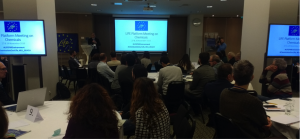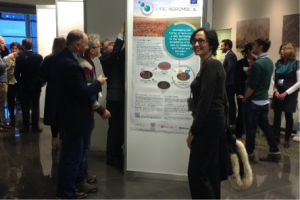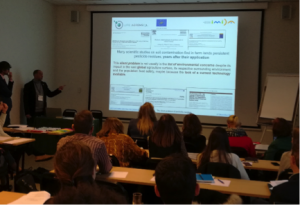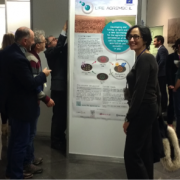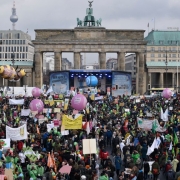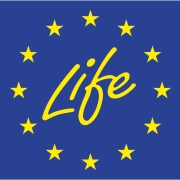Europe’s Common Agricultural Policy (CAP) was a big issue at this year’s Green Week in Berlin. With all the billions of euros available, the agro-ecological transition is more than possible, especially if subsidies to agribusiness and factory farms were stopped, write Harriet Bradley and Trees Robijns.
Harriet Bradley is EU Agriculture and Bioenergy Policy Officer at BirdLife Europe. Trees Robijns is Agriculture and Bioenergy Policy Officer at NABU, a German environmental organisation.
We are at the End of the International Green Week in Berlin, an international exhibition of the food, gardening and agriculture industries. While the businesses and marketing people were focusing mainly on digitalisation and high tech, NGOs and civil society took the opportunity to raise the alarm about the real problems. The loudest voice could be heard during the protest march: we are fed up with industrial agriculture! (Wir haben Agrarindustrie satt!).
For the 9th year and this time supported by over 100 organisations and more than 35,000 people, the streets of Berlin were filled with demands for low-impact farming, animal welfare, climate justice and good food, for thriving family farms and rural communities, for biodiversity, for pesticide-free farming, for development cooperation based on ecological principles, and for a just and ecological reform of the EU’s farm subsidies, the Common Agricultural Policy (CAP).
That last topic – the CAP – was quite a big issue at the Green Week, and, even if the industry – and a big chunk of the Green Week organisers – pin all their hopes on high-tech ‘solutions’, civil society turned the spotlight on the politicians and how they are not even acknowledging the real issues of huge insect and farmland bird declines, the disappearance of small farmers and the sustainability of animal production.
In the same week, yet more studies and media revelations reminded the public of the sobering reality of Europe’s current farming model and subsidy system, calling the bluff on the shiny propaganda of the official Green Week fair.
And the fact that there is a lot of ‘bluff’ to be called across the EU is illustrated by the following examples from Germany.
- The biodiversity crisis: where German scientists showed a real insectageddon inside nature protection areas. While the WHO is pointing at the carcinogenic effects of pesticides like glyphosates, the former Agriculture Minister Schmidt gave the go ahead to renew the controversial herbicides’ licence without the consent of his government colleagues causing a big popular uproar.
- The horrendous animal welfare situation which has been exposed by video material, shot by undercover activists in factory farms.
- And last but especially not least: the Common Agricultural Policy (CAP), where the Scientific Advisory Councils to both the agriculture – as well as the environment – ministry strongly criticise the policy, which spends most of the money on flawed direct income payments that are free of any meaningful conditions.
After all this science and public uproar, it is astonishing how many EU governments and Members of the European Parliament are happily taking very clear positions to weaken down the policy, while Germany remains mostly silent.
Those speaking up are pursuing an aggressive simplification agenda: making eco-schemes voluntary, further weakening environmental spending in Pillar 2 and ring fencing money for direct income payments instead, hollowing out the basic principles of the ‘conditionality’ (the baseline for payments, previously called ‘cross compliance’ and ‘greening’), bringing in even more income support tools that harm the environment like risk management etcetera, etcetera. The list just goes on and on.
It is time to show where you stand now. Today the Agriculture Ministers of each EU country are meeting again, and they are discussing the green architecture and the ‘new delivery model’ which promised a new CAP focused on results and higher environmental ambition. We expect Germany and all other Member States to inspire us with their vision for the future of food and farming, and therefore call on ministers to stand up for nature, climate and nature-friendly farmers by supporting:
- Real money for nature, the environment and climate: The next CAP needs to deliver at least €15bn per year for effective biodiversity measures, to be funded out of an overall 50% ring-fencing across the CAP for all environment and climate measures.
- An end to perverse subsidies by ending the harmful aspects of coupled support, investment aid, areas of natural constraints payments, risk management and direct payments
- Real law enforcement by strengthening the conditionality for farms getting subsidies, including setting common baselines such as 10% space for nature on all farms
- A strong accountability and performance framework, including SMART objectives and rigorous indicators, the inclusion of environmental authorities and public interest civil society organisations in decisions on how the money is spent and finally sufficient penalties and incentives systems for Member States so as to encourage strong environmental ambition and punish cheating
With all the billions of euros available, agro-ecological transition is more than possible, all the more so if subsidies to agribusiness and factory farms were stopped. All that is currently missing is the political will to stand up to the intensive farm lobby and agribusiness interests.
In just a few months time, Europe will go to the polls. The result will have a huge impact on biodiversity, climate and long-term food production, but also on our fundamental values and rights as both citizen’s and civil society organisations. Let’s make the CAP another reason for Europe’s citizens’ to believe in Europe, and answer their demands for a fundamental reform towards environmentally sustainable farming, before they cast their vote.
Source: https://www.euractiv.com/section/agriculture-food/opinion/citizens-are-fed-up-with-industrial-agriculture/
